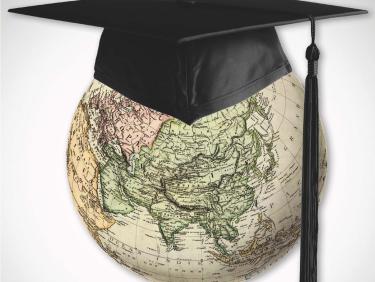Studies Master's Program (MATS)
Students in the Master of Arts in Transcultural Studies (MATS) learn about cultural exchange processes, transformations and interweavings between, or in, Asia and Europe. The transregional approach applied in Transcultural Studies questions traditional ideas about cultures in ethnically contained, linguistically homogenous and territorially limited areas. The MATS is an English-medium, research-oriented program combining interdisciplinary education with a transregional focus predominantly on East/South Asia and Europe. It strengthens and expands students' theoretical knowledge and methodological competencies in a broad spectrum of disciplines in the Humanities and Social Sciences.

Overview
The transregional outlook of the MATS is based on the perspective that cultures are not contained within ethnically closed, linguistically homogenous and territorially bounded spheres. They are instead constituted through transformations and entanglements that follow from contacts and relationships between various agents, concepts and institutions. The analysis of such processes of transformation, exchange and entanglements requires a transcultural approach which makes use of a methodological and theoretical framework beyond that of a single, traditional discipline.
The MATS expands the regional and disciplinary background students have obtained in their previous degree(s). Each student selects one out of three study foci: “Knowledge, Belief and Religion (KBR)”, “Society, Economy and Governance (SEG)”, or “Visual, Media and Material Culture (VMC)”.
The program also offers an international variant, a joint program with Kyoto University (Japan), for which students can apply separately within the first semester of their study.
Application
For its program start in October of each year we welcome applications from students interest in Transcultural Studies, who have obtained a Bachelor's degree in a discipline of the Humanities or Social Sciences and are motivated to engage in a research-oriented, interdisciplinary MATS.
Enrolment, Fees, Living
Moving to Heidelberg to start a new study program means a huge step in students' academic and personal lives and involves some careful planning and administrative steps. After that, student life at Germany's oldest university promises to be a special, formative experience.
Structure
The MATS regularly covers four semesters full-time study in English. The first three semesters are dedicated to coursework - mainly seminars that require a substantial amount of student participation. The fourth semester is dedicated for writing the thesis and completing the degree. In the course of the first semester students select on out of the three available study foci.
Mobility
Students in the MATS can use the third semester in the program as a “mobility window” to expand and deepen their transcultural competencies by either studying at a research institution related to or complementing the transcultural agenda of the MATS, or conducting a guided, research-oriented internship.
Degree
Students collect the majority of the required credits through the coursework in the first three semesters. For obtaining the degree “Master of Arts (M.A.)” they take an oral examination and submit a thesis in the fourth semester.
Career Opportunities
The Master’s in Transcultural Studies is a research-oriented program. Naturally, many of the graduates continue with an academic career by starting a doctoral project. However, depending on the respective specialization during the course of study, graduates of our program have a large variety of career opportunities , i.e. in the cultural sphere, cultural management, internationally operating and global companies, international institutions, non-governmental institutions etc.
